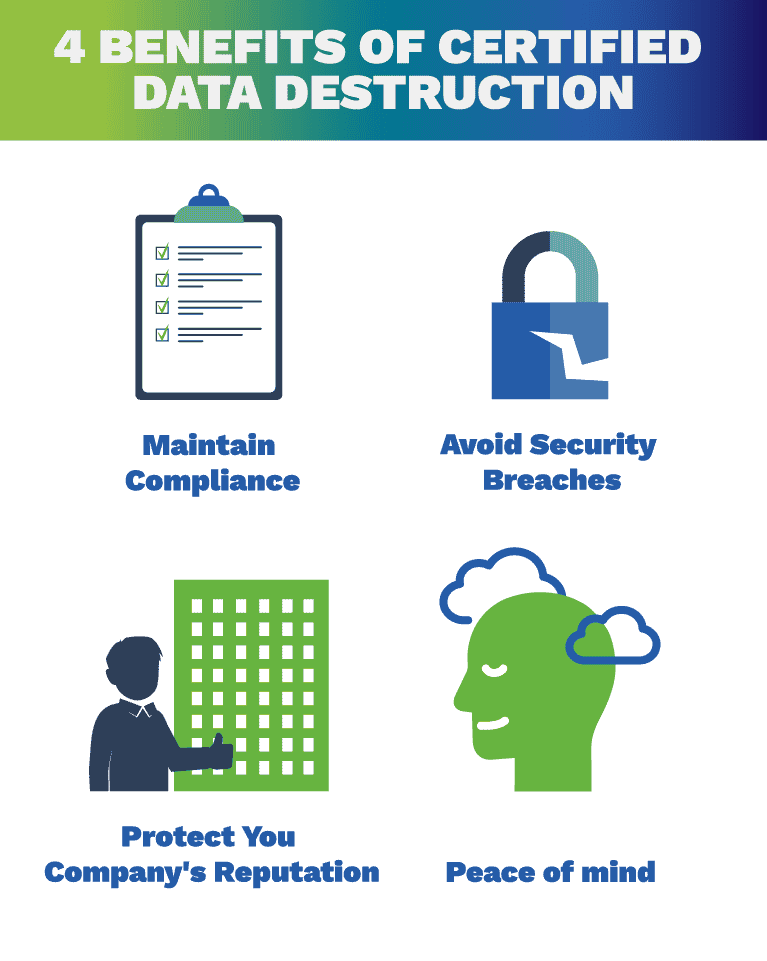Maximizing Cyber Security through Advanced Data Destruction Approaches
Maximizing Cyber Security through Advanced Data Destruction Approaches
Blog Article
The Significance of Effective Data Devastation Practices in Shielding Sensitive Details and Ensuring Computer Protection
In an age where information breaches are progressively typical, the significance of effective data devastation practices can not be overemphasized. Applying durable information damage techniques not only minimizes these dangers yet likewise lines up with legal conformity demands, making certain that companies maintain their track record and foster client depend on.
Comprehending Information Destruction
Recognizing information devastation is essential in today's digital landscape, where sensitive info can conveniently be endangered. Efficient information destruction entails not simply ensuring but erasing documents that information is irretrievable via extensive approaches. This procedure is essential for organizations that manage confidential customer details, copyright, or internal files, as any kind of violation can cause severe monetary and reputational effects.
Information devastation includes various methods, including shredding physical media, degaussing magnetic storage space devices, and utilizing software-based remedies that overwrite data several times. Each method offers a certain purpose and needs to straighten with the sensitivity of the information being disposed of. Physical devastation is typically liked for tough drives having highly private data, while software application methods could be adequate for less delicate details.
Moreover, sticking to sector criteria and guidelines, such as the General Information Defense Law (GDPR) or the Wellness Insurance Policy Transportability and Liability Act (HIPAA), is important for compliance and to mitigate lawful threats. Organizations needs to establish a robust information devastation policy, train employees on best techniques, and consistently examine their treatments to guarantee that all sensitive details is disposed of securely and successfully.
Dangers of Inadequate Practices
Insufficient information devastation methods expose companies to considerable risks that can have far-ranging consequences. When delicate info is not correctly disposed of, it continues to be susceptible to unapproved gain access to, which can result in information violations and identity burglary. Such occurrences not only jeopardize the safety and security of people however additionally taint the company's credibility, causing a loss of client trust and prospective financial consequences.
Moreover, regulative compliance is progressively rigorous in numerous sectors. Failure to follow data damage laws can lead to substantial penalties and lawful activities versus organizations. These fines can draw away and strain monetary sources attention from core organization operations.
Additionally, the abuse of recurring data can lead to intellectual building theft or business reconnaissance, threatening competitive benefits (data destruction). The effect of inadequate information devastation prolongs past instant financial losses; it can additionally cause lasting damage to brand stability and market position

Organizations have to acknowledge that data safety and security is not exclusively about avoiding violations; it likewise encompasses the liable administration of data throughout its lifecycle. Overlooking reliable information devastation methods can have catastrophic implications, underscoring the necessity for robust steps to reduce these risks.
Best Practices for Data Destruction
Carrying out reliable information damage methods is necessary for guarding delicate info and preserving compliance with regulative standards. Organizations should take on a multi-faceted approach to make certain that information is irretrievable, consequently protecting against unapproved gain access to and potential breaches.
First, data must be categorized based on level of sensitivity, enabling organizations to use suitable destruction approaches customized to the level of threat. For digital data, making use of software-based data-wiping devices that adhere to market requirements can efficiently overwrite existing information. Physical damage methods, such as shredding or degaussing, are crucial for tools that store delicate info, making sure complete obliteration.
Establishing a clear information retention policy is vital, describing exactly how long various sorts of details need to site be maintained before damage. Regular audits of information storage space systems are likewise necessary to determine unneeded or outdated information requiring removal.
In addition, training workers on the relevance of data devastation and the details protocols to follow fosters a society of security within the organization. Maintaining visit this web-site documentation of information devastation refines provides responsibility and sustains conformity with inner plans and outside guidelines. By sticking to these ideal practices, companies can considerably reduce the dangers connected with data exposure.
Legal and Conformity Factors To Consider

Failing to conform with these laws can lead to extreme penalties, consisting of substantial fines and reputational damages. Organizations should carry out a robust data devastation policy that lines up with these lawful structures and offers clear standards on the proper techniques of information disposal, whether physical shredding or electronic wiping.
Additionally, maintaining paperwork of information destruction tasks is vital for showing compliance during audits or assessments. By focusing on legal and compliance factors to consider, companies can enhance their data protection pose and foster trust fund with stakeholders and customers, ultimately contributing to a much more safe and secure data management environment.
Benefits of Effective Information Devastation
Reliable data destruction practices extend beyond simple compliance; they use substantial benefits to companies that prioritize them. By guaranteeing that sensitive info is irretrievably ruined, companies alleviate the danger of information violations and the potential economic consequences related to them. This positive approach not just safeguards versus unapproved accessibility yet additionally boosts the general reliability of the company in the eyes of customers and stakeholders.
Carrying out durable data damage methods, such as physical destruction of storage space tools or sophisticated data cleaning strategies, adds to the strengthening of an organization's cybersecurity posture. data destruction. It reduces the likelihood of intellectual property burglary and secures proprietary information, thus maintaining an affordable side in the marketplace

Conclusion
Finally, effective information damage practices are crucial for protecting sensitive info and boosting overall computer security. By carrying out thorough methods such as software program, shredding, and degaussing overwriting, companies can mitigate the threats connected with unapproved accessibility and data violations. Adherence to governing criteria, consisting of GDPR and HIPAA, more enhances conformity and protects against lawful effects. Inevitably, a dedication to durable information devastation methods promotes a culture of obligation, consequently enhancing an organization's cybersecurity position and maintaining customer depend on.

Report this page